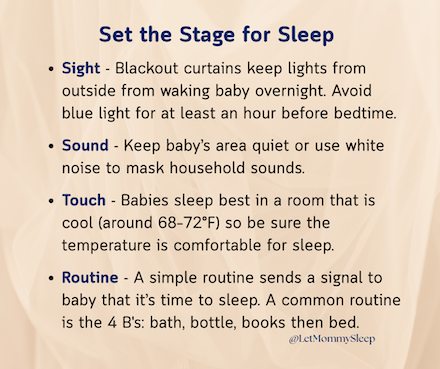Why Your Baby Wakes Overnight
updated, July 15, 2025 – Our team of night nannies and baby nurses get lots of questions about how to help babies to sleep through the night! Just because a baby “should be” old enough to sleep 8 hour stretches, doesn’t mean that they will. This blog, Why Your Baby Wakes Overnight will help you figure out why your infant still wakes, and how to help them get back to sleep peacefully.
Key Takeaways
- When you know your baby has had enough food to make it 8 hours without eating, the common reasons for night wakings are:
- Illness or congestion (especially when lying flat)
- Teething pain
- Habitual wakefulness following a 3–4 hour day schedule
- Swaddling should stop when baby starts rolling or consistently breaks free.
- Overnight feeds and pacifier use can be reduced or eliminated gradually or abruptly.
- A comfortable and safe sleep environment is also important to helping baby sleep through the night.
- There are a lot of right answers: what matters most is what supports a happy, safe and well-rested family

Why Your Baby Wakes Overnight
1. Why does my baby wake through the night when I know he or she is not hungry?
There are typically 3 reasons for this:
- Illness – when baby has an illness or discomfort such as congestion or ear infection; laying horizontally makes fluid in the inner ear or chest settle and makes getting comfortable very difficult for baby. Baby might also need their nasal passages cleared. Responding to baby quickly, for as long as baby needs is of course recommended.
- Teething – good old teething pain is often the answer to overnight wakefulness. Comforting baby is again the way to go (of course!)
- Habit – for healthy babies who have never slept through the night (and we are not saying whether they should or shouldn’t) wakefulness overnight means they are simply repeating their 3-4 hour daytime schedule of being awake for a few hours and then going to sleep for a few hours. For parents wishing to increase baby’s sleep time in this case, a gentle weaning of overnight feeds and increase in daytime feeds is appropriate. Here’s what we mean by that.
2. How do I know when to get rid of the swaddle?
When baby is rolling onto her stomach, the swaddle becomes a hazard. When baby is consistently “busting out” in the late 3rd month or month 4, he’s telling you he does not need the swaddle anymore. To eliminate the swaddle parents can simply go cold turkey or take a gradual step-down approach where we allow one arm out for several nights, then 2 arms and then eventually no swaddle at all.
3. How do I eliminate overnight feeds/the pacifier?
Anytime we are helping baby -and well, anyone really- learn a new way to do things we have two choices: cold turkey or gradual introduction. Cold turkey certainly cuts to the chase, but the gradual approach can be much more gentle and less jarring for baby.
For feeding this means that we can eliminate milk/formula altogether between certain hours or we can gradually wean the amount taken in during these hours. For nursing moms, gradual weaning is essential…it’s more gentle for baby and also gives mom’s body time to adjust. When it comes to the pacifier we can “cold turkey” it or gradually remove the pacifier after less and less time per pacifier “session”. For sleep training, it’s typically recommended to remover pacifier when baby stops sucking for a few moments, repeating this removal over and over until the pacifier is eventually not needed.
Creating a Calm Sleep Environment
One last factor that shouldn’t be overlooked in helping a baby sleep through the night is a consistent, calm sleep environment.
- Feel – Babies sleep best in a room that is cool (around 68–72°F) so be sure the temperature is comfortable for sleep. Also ensure baby is dressed properly.
- Sound – Keep baby’s room quiet or use white noise to mask household sounds.
- Sight – Blackout curtains signify it’s time for rest and also keep outside lights from waking baby overnight. Avoid blue light devices and stimulating play in the hour before bedtime, as this can interfere with melatonin production.
- Routine – A simple routine like dimming the lights, changing into pajamas, and reading a short book or singing a lullaby sends a strong signal to baby that it’s time to wind down and sleep. A common routine is also the 4 B’s: bath, bottle, books then bed.
Whether baby room shares with you, sleeps in a crib, uses a pacifier or does any number of other sleep behaviors, there are a LOT of right answers. As long as baby is safe, it’s always okay to do what works to make a happy and peaceful family.

Categories
- Archives
- Baby Sleep Advice
- Expert Guides
- Hiring a Night Nanny
- Infant Safety
- Postpartum Health
- Twins & Multiples
